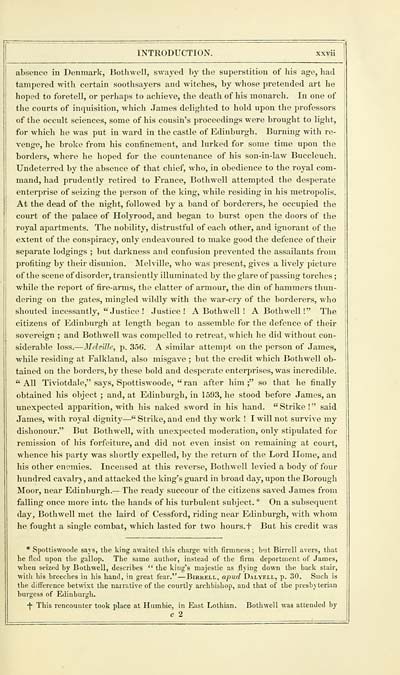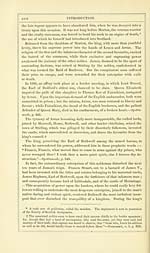Download files
Complete book:
Individual page:
Thumbnail gallery: Grid view | List view

INTRODUCTION.
absence in Denmark, Bothwell, swayed by the superstition of his age, had
tampered with certain soothsayers and witches, by whose pretended art he
hoped to foretell, or perhaps to achieve, the death of his monarch. In one of
the courts of inquisition, which James delighted to hold upon the professors
of the occult sciences, some of his cousin's proceedings were brought to light,
for which he was put in ward in the castle of Edinburgh. Burning with re-
venge, he broke from his coniinement, and lurked for some time upon the
borders, where he hoped for the countenance of his son-in-law Buccleuch.
Undeterred by the absence of that chief, who, in obedience to the royal com-
mand, had prudently retired to France, Bothwell attempted the desperate
enterprise of seizing the person of the king, while residing in his metropolis.
At the dead of the night, followed by a band of borderers, he occupied the
court of the palace of Holyrood, and began to burst open the doors of the
royal apartments. The nobility, distrustful of each other, and ignorant of the
extent of the consjiiracy, only endeavoured to make good the defence of their
separate lodgings ; but darkness and confusion prevented the assailants from
profiting by their disunion. INIelville, who was present, gives a lively picture
of the scene of disorder, transiently illuminated by the glare of passing torches ;
while the report of fire-arms, the clatter of armour, the din of hammers thun-
dering on the gates, mingled wildly with the war-cry of the borderers, who
shouted incessantly, " Justice ! Justice ! A Bothwell ! A Bothwell ! " The
citizens of Edinburgh at length began to assemble for the defence of their
sovereign ; and Bothwell was compelled to retreat, which he did without con-
siderable loss. — Mehille, p. 356. A similar attempt on the person of James,
while residing at Falkland, also misgave ; but the credit which Bothwell ob-
tained on the borders, by these bold and desperate enterprises, was incredible.
" All Tiviotdale," says, Spottiswoode, " ran after him ;" so that he finally
obtained his object ; and, at Edinburgh, in 1593, he stood before James, an
unexpected apparition, with his naked sword in his hand. " Strike ! " said
James, with royal dignity — " Strike, and end thy work ! I will not survive my
dishonour." But Bothwell, with unexpected moderation, only stipulated for
remission of his forfeiture, and did not even insist on remaining at court,
whence his party was shortly expelled, by the return of the Lord Home, and
his other enemies. Incensed at this reverse, Bothwell levied a body of four
hundred cavalr;y, and attacked the king's guard in broad day, upon the Borough
Moor, near Edinburgh.— The ready succour of the citizens saved James from
falling once more into the hands of his turbulent subject. * On a subsequent
day, Bothwell met the laird of Cessford, riding near Edinburgh, with whom
he fought a single combat, which lasted for two hours.t But his credit was
* Spottiswoode says, the king awaited this charge with firmness; hut Birrell avers, that
he fled upon the gallop. The same author, instead of the firm deportment of James,
when seized by Bothwell, describes " the king's majestie as flying down the back stair,
with his breeches in his hand, in great fear." — Birkell, apud Dalyell, p. 30. Such is
the difference betwixt the nairative of the courtly archbishop, and that of the presbyterian
burgess of Edinburgh.
f This rencounter took place at Humble, in East Lothian. Bothwell was attended by
c 2
absence in Denmark, Bothwell, swayed by the superstition of his age, had
tampered with certain soothsayers and witches, by whose pretended art he
hoped to foretell, or perhaps to achieve, the death of his monarch. In one of
the courts of inquisition, which James delighted to hold upon the professors
of the occult sciences, some of his cousin's proceedings were brought to light,
for which he was put in ward in the castle of Edinburgh. Burning with re-
venge, he broke from his coniinement, and lurked for some time upon the
borders, where he hoped for the countenance of his son-in-law Buccleuch.
Undeterred by the absence of that chief, who, in obedience to the royal com-
mand, had prudently retired to France, Bothwell attempted the desperate
enterprise of seizing the person of the king, while residing in his metropolis.
At the dead of the night, followed by a band of borderers, he occupied the
court of the palace of Holyrood, and began to burst open the doors of the
royal apartments. The nobility, distrustful of each other, and ignorant of the
extent of the consjiiracy, only endeavoured to make good the defence of their
separate lodgings ; but darkness and confusion prevented the assailants from
profiting by their disunion. INIelville, who was present, gives a lively picture
of the scene of disorder, transiently illuminated by the glare of passing torches ;
while the report of fire-arms, the clatter of armour, the din of hammers thun-
dering on the gates, mingled wildly with the war-cry of the borderers, who
shouted incessantly, " Justice ! Justice ! A Bothwell ! A Bothwell ! " The
citizens of Edinburgh at length began to assemble for the defence of their
sovereign ; and Bothwell was compelled to retreat, which he did without con-
siderable loss. — Mehille, p. 356. A similar attempt on the person of James,
while residing at Falkland, also misgave ; but the credit which Bothwell ob-
tained on the borders, by these bold and desperate enterprises, was incredible.
" All Tiviotdale," says, Spottiswoode, " ran after him ;" so that he finally
obtained his object ; and, at Edinburgh, in 1593, he stood before James, an
unexpected apparition, with his naked sword in his hand. " Strike ! " said
James, with royal dignity — " Strike, and end thy work ! I will not survive my
dishonour." But Bothwell, with unexpected moderation, only stipulated for
remission of his forfeiture, and did not even insist on remaining at court,
whence his party was shortly expelled, by the return of the Lord Home, and
his other enemies. Incensed at this reverse, Bothwell levied a body of four
hundred cavalr;y, and attacked the king's guard in broad day, upon the Borough
Moor, near Edinburgh.— The ready succour of the citizens saved James from
falling once more into the hands of his turbulent subject. * On a subsequent
day, Bothwell met the laird of Cessford, riding near Edinburgh, with whom
he fought a single combat, which lasted for two hours.t But his credit was
* Spottiswoode says, the king awaited this charge with firmness; hut Birrell avers, that
he fled upon the gallop. The same author, instead of the firm deportment of James,
when seized by Bothwell, describes " the king's majestie as flying down the back stair,
with his breeches in his hand, in great fear." — Birkell, apud Dalyell, p. 30. Such is
the difference betwixt the nairative of the courtly archbishop, and that of the presbyterian
burgess of Edinburgh.
f This rencounter took place at Humble, in East Lothian. Bothwell was attended by
c 2
Set display mode to: Large image | Transcription
Images and transcriptions on this page, including medium image downloads, may be used under the Creative Commons Attribution 4.0 International Licence unless otherwise stated. ![]()
| Early Gaelic Book Collections > J. F. Campbell Collection > Minstrelsy of the Scottish border > (35) |
|---|
| Permanent URL | https://digital.nls.uk/80600845 |
|---|
| Description | Volumes from a collection of 610 books rich in Highland folklore, Ossianic literature and other Celtic subjects. Many of the books annotated by John Francis Campbell of Islay, who assembled the collection. |
|---|
| Description | Selected items from five 'Special and Named Printed Collections'. Includes books in Gaelic and other Celtic languages, works about the Gaels, their languages, literature, culture and history. |
|---|

